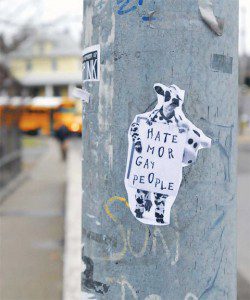 To be honest, I did not expect anything near the stir my first piece caused about deciding not to eat at Chick Fil A anymore. I’ve written lots of articles about LGBT equality before, but when you bring a favorite business into the mix, people get remarkably passionate.
To be honest, I did not expect anything near the stir my first piece caused about deciding not to eat at Chick Fil A anymore. I’ve written lots of articles about LGBT equality before, but when you bring a favorite business into the mix, people get remarkably passionate.
For the most part, I’ve enjoyed and appreciated the dialogue between those who choose not to eat there any more and those who take issue with such a decision. However, based on some of the comments I’ve seen, I think a little bit of clarity is in order.
Is this a boycott? I’m not calling for some big, formal boycott. I’ve decided not to eat there anymore because of their public stance on “traditional marriage,” and because of their donations to groups that I consider not just to be supporters of opposite-sex-only marriage, but groups (like Family Research Council and Exodus International*) that have in the past or continue to practice so-called reparative therapy to deprogram gay people, with the goal of making them straight.
As for those who feel this is overstating Chick Fil A’s position on LGBT rights, I would note that they were co-sponsors of an event in 2011 with the Pennsylvania Family Institute, which actively fought to strike down California’s Proposition 8, and which also worked aggressively to oppose an anti-discrimination bill in Pennsylvania which sought to include sexual orientation as unlawful grounds for individual discrimination.
Is this simply pro-traditional-marriage and family or actively anti-gay? Everyone has to decide for themselves, but I choose not to support such efforts, and I think others appreciate knowing where their money goes.
What’s wrong with supporting traditional marriage? Every organization and individual certainly is within their rights to stand up for the values they  deem are important. But in doing so, you have to expect that some people will disagree with you, and that it may have an impact on your business. I take public positions all the time as a professional writer/blogger. Some of those positions cause readers to walk away from me, or even openly criticize me, or to encourage others not to read what I write. I do what I do knowing that’s a possible consequence.
deem are important. But in doing so, you have to expect that some people will disagree with you, and that it may have an impact on your business. I take public positions all the time as a professional writer/blogger. Some of those positions cause readers to walk away from me, or even openly criticize me, or to encourage others not to read what I write. I do what I do knowing that’s a possible consequence.
The biggest personal issue I have with the typical case for traditional marriage is that it offers no alternative avenue to afford equal rights to those who do not align with that group’s definition of “traditional.” It is a position of privilege and power to be in a place where you get to define the rules people must follow to be recognized as equals, and with such power comes an expected calling to account for those decisions.
Boycotts don’t do any good. Some argue that making a public issue of this kind of thing only serves to reinforce the convictions of those who agree with Chick Fil A’s stance on marriage and equal rights, and that their commitment to support the business even more ardently cancels out my decision not to spend money there. Could be. I’m not trying to bring the company down. I’m interested in two things: putting my money where my values are as much as I can, and informing readers so they can make an informed decision too. Do all of my economic decisions ascribe to a morally perfect model? no. But when I know better, I try to do better, and in this case, I don’t agree with the company’s sponsorship and support of events and organizations I deem as actively campaigning against the rights of fellow human beings.
Don’t they have a right to their opinions and values? Yes. But I am also entitled to mine, and one of the most powerful tools I have as a consumer is in my wallet. If I don’t use my money to support the businesses I see as consistent with my own values, I’m missing an opportunity. Also, if I feel one person’s values takes away rights from someone else, I feel compelled to say and do something about it.
 Boycotts are self-aggrandizing tools of the left. I’ve heard this one tossed around quite a bit, as if conservatives never boycott anything. I did some articles and interviews about the recent “Blue Like Jazz” movie, based on the book of the same name. Because of some of the theological positions taken in the film, some folks opted not to see it. In fact, the senior pastor of Sherwood Baptist Church – which funds and produces many of the most popular Christian-themed movies in the mainstream media today – issued a boycott against the movie. In fact, he went further, stating that anyone who had anything to do with production or promotion of the film would not work on any Sherwood films again. He also leaned on Provient Films, a co-production company of Sherwood’s movies and distributor of the movies, tried to force Provident to keep Blue Like Jazz trailers from running ahead of any of their films. In making the case, the pastor both admitted he had not seen the movie, and he also made a false statement, claiming that the words “I hate Jesus” appeared in the preview, which they did not.
Boycotts are self-aggrandizing tools of the left. I’ve heard this one tossed around quite a bit, as if conservatives never boycott anything. I did some articles and interviews about the recent “Blue Like Jazz” movie, based on the book of the same name. Because of some of the theological positions taken in the film, some folks opted not to see it. In fact, the senior pastor of Sherwood Baptist Church – which funds and produces many of the most popular Christian-themed movies in the mainstream media today – issued a boycott against the movie. In fact, he went further, stating that anyone who had anything to do with production or promotion of the film would not work on any Sherwood films again. He also leaned on Provient Films, a co-production company of Sherwood’s movies and distributor of the movies, tried to force Provident to keep Blue Like Jazz trailers from running ahead of any of their films. In making the case, the pastor both admitted he had not seen the movie, and he also made a false statement, claiming that the words “I hate Jesus” appeared in the preview, which they did not.
All this is to say that activism cuts both ways. Painting this as an exclusively “liberal” phenomenon is ignorant.
*Exodus International’s president did finally announce a few weeks ago that they would stop the practice of reparative therapy as part of their organizational practice, although they continue to employ people who endorse the practice.











